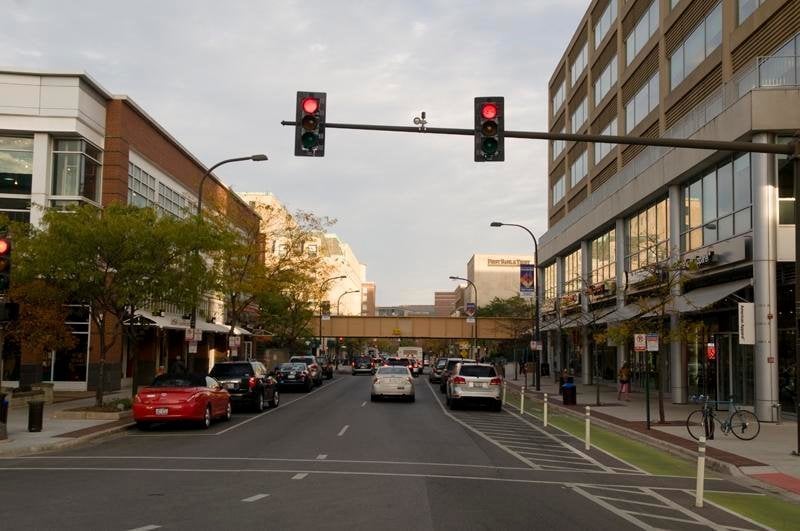Proposed 2022 city budget centers economic recovery, human services
Cars drive down an Evanston street. The 2022 budget listed some top priorities for the next fiscal year as supporting underserved communities impacted by the pandemic, investing in economic development and addressing chronic city underfunding.
October 12, 2021
City Council released Evanston’s 2022 proposed budget Monday, suggesting the allocation of more funding to economic recovery from the pandemic, human services and pensions.
The proposed budget, authored by Interim City Manager Kelley Gandurski, represents an increase of nearly $60 million from that of 2021. Over half of the increase comes from American Rescue Plan Act funding.
City staff listed some top priorities for the next fiscal year as supporting underserved communities impacted by the pandemic, investing in economic development and addressing chronic city underfunding.
Last week’s City Council meeting included a discussion about allocating the $43 million Evanston is receiving through ARPA. City staff recommended the largest portion to be allocated to “Revenue Loss Funding,” which includes hazard pay for some city employees.
Councilmembers also debated the best way to use ARPA funds toward the city’s Climate Action & Resilience Plan. The Environment Board’s CARP Implementation Task Force recommended a $5 million allocation for projects furthering the city’s goal of carbon neutrality by 2050.
Gandurski said the city’s general fund is on track to maintain a $2 million surplus this year. Added to the $17.4 million currently in the general fund, this will tip the fund over its surplus limit. To counteract this, council will budget $1 million toward general expenses in 2022.
The city has saved on debt payments and made more revenue on entertainment taxes this year than expected. This is set to increase profits by $275,000 from last year, especially due to taxes on digital streaming services.
But revenue from parking tickets is projected to drop significantly throughout the rest of this year, bringing in an estimated $400,000 less than last year, along with hotel and sports entertainment taxes. These sources will be allocated with lower expectations for generating revenue next year.
The city plans to allocate $2,550,000 toward the Health & Human Services budget, mostly to fill 23 of the 29 city government positions left unoccupied during the last year to save money. The city got rid of 15 positions last year, but later said it found civic offices too understaffed.
Gandurski recommended a 9.53% water rate increase and a 5% sewer rate decrease for 2022. The proposed water fund will increase from over $44 million from the 2021 adopted budget to over $57 million.
The combined water and sewer rate for Evanston residents has been stagnant since 2015, marking this year’s 1.96% increase as the first increase in seven years. The average resident will pay $10.32 more per year, while residents qualifying for energy assistance will see a rate decrease by about $189 compared to what they paid in 2021.
However, the Water Fund’s proposed budget does not allocate money to large scale lead service replacement beyond current programs. Gandurski said the city anticipates receiving relevant funding from the Illinois or federal governments.
The police pension fund budget is set to be raised from over $14 million to over $16 million. Meanwhile, the fire pension fund budget will decrease by over $512,000. The police overtime budget will decrease while the fire overtime budget increases.
Some funding allocations will rely on upcoming City Council decisions. Councilmembers are expected to weigh in over the coming weeks on whether the city will continue to fund crossing guard services for Evanston schools, as well as on whether free beach tokens will be available next year.
A funding source has not been established yet for these two programs, Gandurski said in the proposal. So, if the council approves either one, it may inspire an increase in property taxes.
Email: [email protected]
Twitter: @JorjaSiemons
Email: [email protected]
Twitter: @ilana_arougheti
Related Stories:
— City Council increases FY 2020 budget, evaluates COVID-19 revenue losses
— Council discusses American Rescue Plan Act funds, CARP allocations
— $327 million is now available in statewide utilities assistance. Here’s how you can apply.












